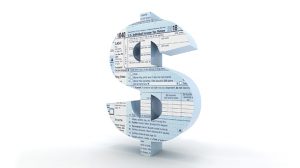Tax reform brings rejuvenation to propane industry

The tax-rate decline positively impacts fiscal-year propane corporations with tax years that overlap the 21 percent rate’s Jan. 1 effective date. Photo: iStock.com/alexsl
As President Donald Trump signed the Tax Cuts and Jobs Act of 2017 into law on Dec. 22, 2017, millions of Americans had unanswered questions. How will this bill affect me? Will my taxes increase or decrease? What should I expect as I prepare for the coming year?
With business and consumer confidence rising, unemployment declining and the stock market accelerating toward record highs on a regular basis, the economic recovery can no longer be denied. And now, thanks to the provisions included in last year’s legislation, the future growth potential of the propane industry can’t be ignored, either. In fact, 2018 is expected to be one of the industry’s best growth periods, primarily due to tax-related reductions, credits and revisions.
As a result, Americans – within and outside the industry – will now have far more answers than questions.
Influencing future generations
The most widely discussed aspect of the Tax Cuts and Jobs Act of 2017 – and for good reason, as it is projected to positively influence the propane industry for years to come – is the significant reduction of the corporate income tax rate, from a previous maximum rate of 35 percent down to 21 percent.
Applicable since Jan. 1, 2018, the tax-rate decline even positively impacts fiscal-year propane corporations with tax years that overlap the 21 percent rate’s Jan. 1 effective date. By using a blended rate, propane corporations can prorate their income between the dates (of the fiscal year) in which the old and new rates applied.
“For individual taxpayers, the graduated rates are also down a few percentage points and income brackets have increased,” says Cindy Belmont, vice president of administration at Delta Liquid Energy. “Overall, less tax will be paid on similar amounts of income.”
Belmont and her co-workers detected a considerable change in their paychecks between the first and second payrolls of January, as their incomes began to rise. Likewise, Jerry Brick, chairman of the National Propane Gas Association (NPGA) and partner at North Star Energy, noticed a rise in his employees’ take-home pay and pointed out the changes as he personally delivered checks to them.
“They were quite elated and surprised. They thought this wasn’t for the little guy, given what they had heard on the news,” he explains. “They’ve quickly learned that tax reform is for them though and it’s going to be very positive – to the point in which they’ll receive $1,000 to $3,000 in more take-home pay this year alone.”
As a result of the rise in take-home pay, Gary France, former chairman of NPGA and current owner of France Propane Service Inc., believes his customers will have more disposable income to pay their energy bills on time, purchase more propane for additional appliances and cut less wood.
In preparation for the rise in propane usage, companies must ensure they’re utilizing up-to-date equipment and paying their employees the market wage. If they don’t, top talent will look elsewhere for new positions – even outside the propane industry.
“It will be harder to retain employees, as other industries expand and look to fill positions,” France says. “We better be prepared to offer them more than we have in the past, or else they’ll find another industry that provides higher incomes and better equipment.”
In preparation for the tax cuts’ future influences on the industry, Brick notes that organizations’ reactions to the Act will depend on their viewpoints of trickle-down economics. If they believe in the concept, then they will be more prepared for an economic boost, as people will eventually spend more money. If they have negative outlooks, then they must take the risk of not being adequately prepared for potential future growth.
“This is a huge deal, as we haven’t seen this in a long, long time,” Brick says. “Simply put, there are going to be benefits we’ll feel for generations.”

The Alternative Fuel Excise Tax Credit currently offers a tax incentive for alternative fuels, including propane, used to operate motor vehicles or sold for such usage. Photo courtesy of the propane education & research Council
Alternative fuel tax credits
Last year, many leaders of the propane industry lobbied for an extension of the Alternative Fuel and Alternative Fuel Mixture Excise Tax Credits.
Although the incentives – which expired on Dec. 31, 2016 – weren’t extended for several years, as many propane industry insiders had hoped, they were extended for one more year (through Dec. 31, 2017), and some congressional members are currently discussing further extensions.
The Alternative Fuel Excise Tax Credit currently offers a tax incentive (50 cents per gallon) for alternative fuel, including propane, used to operate motor vehicles or is sold for such usage. In the meantime, the Alternative Fuel Mixture Excise Tax Credit provides an incentive (50 cents per gallon) for alternative fuel that is used to produce mixtures. Compressed and liquefied natural gas, liquefied hydrogen and propane are among the qualified alternative fuels that can be used to produce a mixture containing at least 0.1 percent gasoline, diesel or kerosene. The blend can then be used as a fuel in a blender’s trade or business.
“The credits are huge for us since we’re involved in the propane automotive refueling market. Along with the tax cuts, they’re probably the most positive impact of the Act,” Belmont says. “They’re also a great win for our fleet customers, as they look to replace their vehicles with cleaner, alternative fuel propane vehicles.”
Although they’re disappointed the credits weren’t extended to 2022, as they had lobbied for, Brick, along with Phil Squair, senior vice president of public and governmental affairs at NPGA, is optimistic that Congress will continue to acknowledge the credits’ benefits and ensure they spark potential alternative fuel propane vehicle purchasers’ interests in the future.
“People need to be incentivized to use such vehicles,” Brick says. “We’ll continue to push for legislation that isn’t only extended for one year, but, rather, can be applicable for many years to come.”
Further solutions for increased profits
Prior to 2018, propane businesses with yearly gross receipts of $10 million or less – on average within the past three years – could use a completed-contract method for contracts anticipated for completion in two years – rather than determining their taxable incomes for long-term contracts via the usual percentage-of-completion method.
Due to the Act, this gross aggregate has now risen to $25 million, thereby allowing larger propane businesses to only deduct construction costs when such dues are paid and only recognize income formally when contracts are finalized.
Additionally, propane business owners and employees now have larger estate and gift tax exemptions – individually and with their spouses – than they had in the past. On an individual basis, the exemption has risen to $5.6 million (from $5.49 million in 2016). Married couples, on the other hand, can now receive $11.2 million in exemptions from 2018 to 2025.
“The estate tax is much more generous now and will help family-owned propane businesses as they transition in the future,” Squair says. “Not to mention, it will also allow more assets to be transferred to future generations.”
Reinvestments for future growth
Since the law was first enacted in 1969, millions of taxpayers, many of who were middle class citizens, paid the controversial AMT, a shadow tax that led to upwards of $7,000 in additional taxation, on average, according to the IRS.
However, due to the Act, which increased the phase-outs of AMT exemptions – the amount of money that can be subtracted from AMT liabilities – from $54,300 to $70,300 for single filers and from $84,500 to $109,400 for married couples, millions of taxpayers will no longer be affected by the AMT. For example, in 2015, more than 10.3 million households had to calculate AMT liabilities; that number declined to 4.4 million last year and is expected to continue decreasing considerably.
Furthermore, the Act has increased first-year bonus depreciation to 100 percent, beginning on Sept. 27, 2017, and continuing until Jan. 1, 2023. Afterwards, first-year bonus depreciation will decline by 20 percent on an annual basis until Jan. 1, 2027. The depreciation only applies to property that can be used for 20 years or less, and has been purchased from individuals who aren’t family members. Before the Act was enacted, only new property qualified for the depreciation. Today, used property can qualify as well.
“This change in the law, with regards to used assets, motivates propane businesses to purchase equipment and reinvest in [their] necessary assets,” Belmont explains.
According to Brick, the change will help companies of various sizes and structures by providing them with a boost when it comes to investing in their operations.
Of equal importance, Section 179 of the IRS tax code, which allows all businesses to deduct the full purchase prices of qualifying equipment and software that was financed or purchased during the tax year, has also been revised in two significant ways.
First, the limit to the total amount of purchases that can be written off has risen from $500,000 to $1 million. And, second, the deduction begins to phase out after businesses spend $2.5 million. Before, businesses were only allowed to spend $2 million before the deduction phased out.
“It’s much more generous now, as it gives additional capital to small propane businesses interested in purchasing new tanks and equipment,” Squair says. “In turn, they’ll be better prepared to serve their customers and continue to grow in the future.”
Overcoming potential negative impacts
Of course, no legislation is ever perfect. Regardless of their benefits, bills always have some negative consequences.
The negatives of the Tax Cuts and Jobs Act of 2017 – as they pertain to the propane industry – are few and far between. In fact, one negative, against which propane industry leaders lobbied, has been removed from the bill entirely: the highly controversial border adjustment provision. Supporters believed the provision offered pro-growth benefits related to border adjustability, while critics stressed that too many unknowns could have occurred as a result.
“It definitely didn’t seem favorable for the propane industry. In fact, it could have damaged the United States supply chain by increasing exports,” Brick explains. “But now that the provision has been removed, we’ve only been lobbying for further improvements, rather than lobbying against anything.”
Belmont has noticed one negative, in particular, though: an entire repeal of personal property exchanges, including equipment, machinery and vehicles, from Section 1031.
“We’ll really need to update our vehicle fleet more carefully now, as any updates could lead to tax consequences,” she says. “Even so, 2018 – along with the next several years – should be much better tax years for the propane industry as a whole.”
The Act was created to boost the economy and create American jobs, France notes. Though it may not always be perfect, it will positively impact millions of propane professionals for many years, he adds.
















